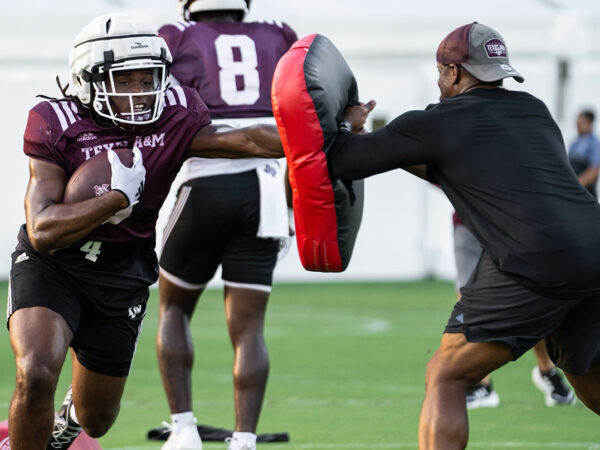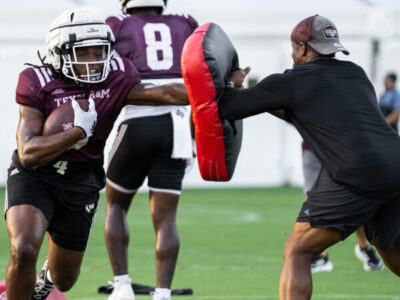Why green sports are good sports
Why should the sports industry care about environmental sustainability? Simply put, the sports that we enjoy today could not take place without a natural environment to compete in, and sport ecology expert Dr. Brian McCullough said sports can also benefit financially by going green.
McCullough, an associate professor in the Department of Health and Kinesiology, said leagues, teams and fans all share a responsibility to promote and choose environmental sustainability in the sports sector.
“It is necessary that a healthy natural environment exists to ensure our enjoyment of participating and watching sport continues,” McCullough said. “It is possible to do so without sacrificing our experiences but may require some behavior modification or rethinking organizational processes to be more sustainable, yet profitable for sport businesses.”
McCullough is the director of the Sport Ecology Laboratory. He has been researching sport ecology, or the bidirectional relationship between sport and the natural environment, for the past 12 years. In 2017 he was invited to contribute to the creation of the United Nations Climate Secretariat’s Sports for Climate Action Framework.
McCullough said recent wildfires, flooding, extreme heat and shorter winter seasons all impact sport — whether we are participating in it or watching it as a spectator.
“We can see the effects that the wildfires in Australia had during the Australian Open or the recent wildfires on the West Coast of the US had on the concerns of air quality and whether or not to delay sport events in baseball and football,” McCullough said.
Sport relies on the well-being of the natural environment to engage in our favorite sports, recreational and physical activities. This is why McCullough created the Sport Ecology Laboratory to empower the sport sector, practitioners, participants and fans to be more sustainable in producing and consuming sport through accessible and practical information resulting from the lab’s research.
Gone green
Some sports leagues and teams have been embracing environmental sustainability even before it became mainstream. The Philadelphia Eagles were the first team in North America to embrace environmental sustainability in 2003, starting with a simple employee recycling program.
“There are a host of sports leagues and individual teams that have focused on a variety of initiatives,” McCullough said. “Some of the most notable are reducing carbon emissions from team travel, stadium operations and even fan travel.”
Today, the Eagles’ efforts include a closed-loop recycling program, water conservation efforts, a bike share program, compostable straws and a carbon offset initiative to plant 10 trees for every field goal made by the team each season. Their sustainability measures earned them LEED Gold status by the U.S. Green Building Council and an ISO 20121 Certification.
However, a soccer club in England — the Forest Green Rovers — have been the most proactive globally and were even recognized for their efforts by the United Nations.
McCullough said carbon offsets and circular economies, like the Philadelphia Eagles have implemented are excellent initiatives that build on the most common gateway initiative, waste management.
“Some of the best organizations achieve zero waste, which means that 90% or more of waste produced at an event is diverted from the landfill by being recycled or composted,” McCullough said.
A recent example of this is Ball’s aluminum drink cup that reduces the amount of plastics disposed of in the stadium. The cup was successfully implemented at the last Super Bowl.
Good for business
McCullough has found that environmental initiatives are lucrative socially and, more importantly to a lot of organizations, economically.
“Promoting such initiatives and having an authentic approach can deepen the loyalty of fans – increasing revenues – and can open new opportunities for corporate partnerships and sponsorship inventory to further increase revenue generation,” McCullough said.
However, a majority of sport organizations are not actively engaging in environmental sustainability initiatives or making the most sustainable choices based on their circumstances. McCullough hopes to promote, advance and refine these initiatives through his research.
“We want to address these issues and find the solutions to overcome these constraints by making a strong business case that show the financial costs and benefits but also the social returns on investment including protecting the natural environment,” McCullough said.
Sport is one piece in the broader puzzle of climate action to address and decrease the global environmental impact of human activity, but it can have a major influence in promoting environmental awareness, social pressure for businesses, corporations and governments to take meaningful action to protect the natural environment.
“Ultimately, taking climate action and addressing the causes of climate change makes not only the natural environment more stable but the global economy and the wellbeing of the global population,” McCullough said.
The Sport Ecology Laboratory partnered with the Green Sports Alliance to celebrate Green Sports Day on Oct. 6.
About the Writer
Heather is responsible for news coverage in the Department of Health and Kinesiology, as well as the Department of Educational Administration and Human Resource Development.
Articles by HeatherFor media inquiries, contact our Media Relations Coordinator, Ashley Green
Fundraising
To learn more about how you can assist in fundraising, contact Amy Hurley, Director of Development ahurley@txamfoundation.com or 979-847-9455














